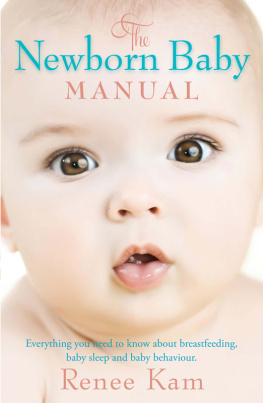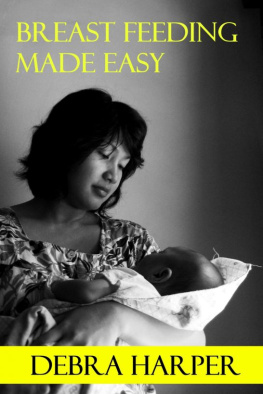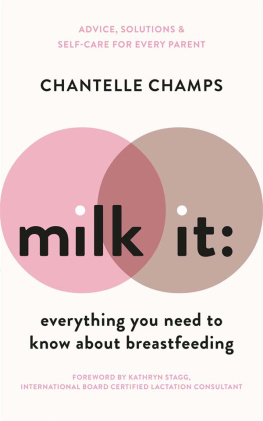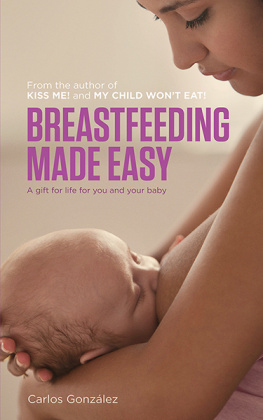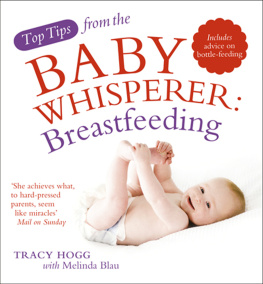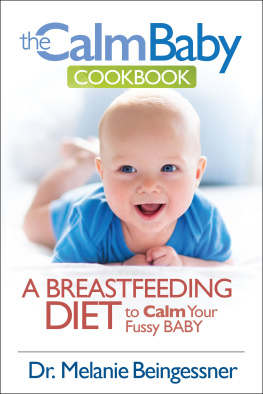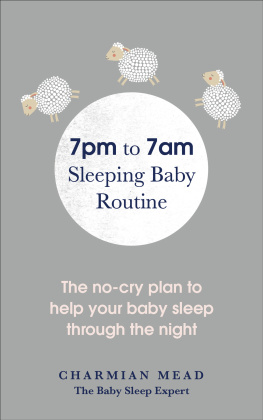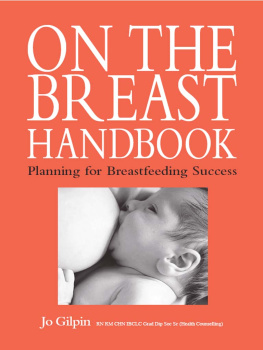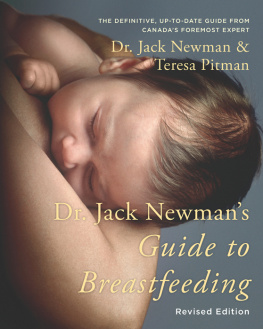
He, she and so on
In this book, for no particular reason, the mother is she, the father is he and the baby is she.
The Newborn Baby Manual by Renee Kam
Published in 2013 by
Jane Curry Publishing 2013
[Wentworth Concepts Pty Ltd]
PO Box 780 Edgecliff NSW 2027 Australia
www.janecurrypublishing.com.au
Copyright Renee Kam, 2013
All rights reserved. No part of this book may be reproduced or transmitted in any form or by any means, electronic or mechanical, including photocopying, recording or by any other information storage retrieval system, without prior permission in writing from the publisher.
National Library of Australia Cataloguing-in-Publication entry
Author: Kam, Renee.
Title: The newborn baby manual: everything you need to know about breastfeeding, baby sleep and baby behaviour/Renee Kam.
ISBN: 9781922190369 (pbk.)
ISBN: 9781922190383 (ebook : epub)
ISBN: 9781922190390 (ebook : Kindle)
Notes: Includes index.
Subjects: InfantsCare.
Child rearing.
Dewey Number: 649.122
Cover image: Shutterstock
Cover and internal design: Deborah Parry
Printed in Australia by McPhersons Printing Group
Contents
About Renee
Renee is an International Board Certified Lactation Consultant, a physiotherapist with an interest in womens health, a mother of two girls, and a volunteer breastfeeding counsellor with the Australian Breastfeeding Association.
She has conducted private antenatal baby education classes since 2008. She is passionate about providing accurate, up-to-date and in-depth antenatal education to expectant parents on breastfeeding, baby sleep and baby behaviour.
Acknowledgements
This book could not have been written if not for the wonderful support and encouragement of my husband, Brandon, my Mum and Dad, my daughters, Jessica and Lara, my mother-in-law, Jenny, father-in-law, Sid, and my dear friends Cath, Rachel, Mardi, Michelle and Lara you are all my rocks.
For much of the knowledge obtained through the years I owe a big thank you to the Australian Breastfeeding Association, particularly the likes of Joy Anderson and Barb Glare, who have answered countless questions that I have posted on ABAChat. I also owe a big thank you to Dr Jack Newman who has answered many of my questions so well and so efficiently.
Photography and illustration credits
Thank you to those who have kindly provided photos or illustrations for this book.
Joy Anderson: page 155
Donna Geddes: page 34
Judy Gifford: page 55
Yvette ODowd: pages 151 and 152
Andrea Polokova: pages 44 and 67
Susan Shaw: page 157
Drew Anderson: pages 69 and 70
Medela Australia Pty Ltd: pages 149 and 150
What this Book is About
This book is for anyone who is expecting a baby or is thinking about having a baby. If you already have a baby, you will still benefit from reading it. You will learn what is normal in terms of baby sleep, baby behaviour and breastfeeding. Although it focuses on the first three months with a new baby but much of the information can apply to the later months.
Introduction
These days, there is so much said or written about solutions for baby sleep problems. From co-sleeping to controlled crying (oops, sorry, is it now called controlled comforting?), everyone seems to have a different solution to a baby sleep problem.
Lets first define a baby sleep problem, which is different for everyone. A problem for some parents is not necessarily a problem for others. In line with this, Is she a good baby? seems to be a common question for new parents. However, everyone has a different perspective on what a good baby is. Is a good baby one who is seemingly undemanding, listless and sleeps a lot? The truth is, such a baby is likely to be undernourished.
New parents can feel immense societal pressure these days. It seems you are doing something wrong and that you are a bad parent if you have a 6-month-old baby who is still not sleeping through the night.
We really are missing the point here. Trying to solve baby sleep problems becomes redundant once accurate and detailed education about normal baby behaviour and sleep, and understanding a babys cues, have been learnt antenatally (and practised immediately post-partum). Once a baby arrives, parents are usually overwhelmed and exhausted, which is not a great time to take on new information. An understanding of normal baby behaviour and baby cues before a baby is born can enable parents to understand their baby and develop a harmonious relationship from the beginning, whatever that may entail for that parent-baby pair.
The World Health Organization recommends exclusive breastfeeding for babies to 6 months of age, and thereafter for breastfeeding to continue alongside suitable complementary foods for up to 2 years and beyond.biological potential. Successful breastfeeding means different things to different mothers. Some mothers may have a goal in mind about how long they wish to breastfeed; others may just want to wait and see how it goes. Many mothers feelings about breastfeeding continue to develop.
Are mothers achieving their breastfeeding goal? It seems there is a strong desire to breastfeed; statistics from the Australian Institute of Health and Welfare (2011) show that 96% of mothers start off breastfeeding. However, despite a desire to breastfeed, the statistics show a sharp decline in both full and partial breastfeeding with each month after birth. By 1 month of age, 56% of babies are fully breastfed. At 3 months, only 39% are fully breastfed, 27% at 4 months and 15% at 5 months. The rates of children receiving any breastmilk are 75% at 1 month, 70% at 3 months, 68% at 4 months, 60% at 6 months, 42% between 7 and 12 months and 7% between 19 and 24 months.
Why are breastfeeding rates dropping like this? Why are many mothers not achieving their breastfeeding goal? Developing a commitment to breastfeeding includes seeing it as the biological and social norm for feeding babies and young children. Antenatal breastfeeding education needs to include advice for mothers about who to contact when problems/questions arise postnatally, so that the right advice is obtained at the right time, before any major problems arise.
Many parents find that problems do arise post-natally, and often feel at wits end, exhausted, confused and not knowing who to turn to or what to do. Well-meaning but conflicting advice from family and friends may add to their confusion. They may find that they simply do not understand their baby and feel that everything they do is wrong. When people ask Is she sleeping through? or Is she a good baby? or Are you still breastfeeding?, it is no wonder they feel their baby is different. So visits to doctors begin, and frequently the result is an ineffectual diagnosis of gastro-oesophageal reflux disease, lactose intolerance or food sensitivity etc, which can lead to more problems. Not a great recipe to start parenthood, the most exciting time of your life.
So what is normal and what is not? Babies just eat and sleep, right? Well, speak to any new parents and I am sure they will tell you this is far from the truth. Raising a baby is both challenging and hard work, to put it lightly. If you think about it, raising a baby without antenatal education is absurd. Who would go into a job interview without preparation? Well, this is the most important job interview in your life, yet most of us go into parenthood almost completely blind. The only knowledge passed on seems to be throwaway lines such as Get all the sleep you can now or Youll be right. When you get there your instincts will kick in.
Next page
